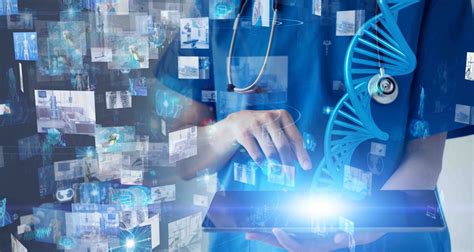In recent years, biotechnology has played a significant role in revolutionizing the healthcare industry. From disease diagnosis to personalized medicine and drug discovery, the field of biotechnology has opened up new possibilities for improving patient outcomes and advancing medical treatments. In this blog post, we will explore the various ways in which biotechnology is transforming healthcare and shaping the future of medicine.
We will begin by providing an overview of biotechnology in healthcare, diving into advancements in disease diagnosis and how biotechnology is revolutionizing drug discovery. Additionally, we will delve into the role of biotechnology in personalized medicine, gene therapy, regenerative medicine, precision medicine, and enhanced imaging techniques. Furthermore, we will discuss the future prospects of biotechnology in healthcare and examine the ethical considerations that come with its integration into the medical field.
Join us as we embark on a journey to understand the vast potential of biotechnology in healthcare and the implications it has on the way we approach medical treatment and care.
Table of Contents
Introduction to Biotechnology in Healthcare
Biotechnology has played a significant role in revolutionizing the healthcare industry, offering new and innovative solutions to various medical challenges. The field of biotechnology encompasses a wide range of scientific disciplines, including genetics, molecular biology, biochemistry, and more, with the primary goal of developing advanced techniques and products to improve human health.
One of the key areas where biotechnology has made a substantial impact is in disease diagnosis. Through the use of biotechnological advancements, healthcare professionals are now able to detect diseases at earlier stages, leading to more effective treatment outcomes and improved patient care.
Furthermore, biotechnology has paved the way for personalized medicine, allowing healthcare practitioners to tailor treatments specifically to an individual’s genetic makeup, ultimately enhancing therapeutic efficacy and reducing side effects. In addition, the field of regenerative medicine has also benefited greatly from biotechnological innovations, offering new hope for patients with previously untreatable conditions.
As we continue to explore the potential of biotechnology in healthcare, it is crucial to consider the ethical implications and ensure that these advancements are used responsibly and ethically. Overall, the introduction of biotechnology in healthcare has opened up a world of possibilities for improving patient outcomes and advancing medical science.
Advancements in Biotechnology for Disease Diagnosis
Biotechnology has made significant strides in the field of disease diagnosis, offering cutting-edge solutions for early detection and accurate identification of various illnesses.
One of the advancements in biotechnology for disease diagnosis is the development of rapid diagnostic tests that utilize biotechnological tools to detect pathogens and diseases with high precision and efficiency.
Furthermore, biotechnology has paved the way for the invention of personalized diagnostic tools, which can identify specific genetic markers and biomarkers associated with different diseases, enabling healthcare professionals to tailor treatment plans according to individual patient needs.
Moreover, the integration of advanced technologies such as next-generation sequencing and CRISPR-based diagnostic tools has revolutionized disease diagnosis, providing faster and more accurate results, ultimately leading to improved patient outcomes.
Revolutionizing Drug Discovery through Biotechnology
In recent years, biotechnology has played a pivotal role in revolutionizing the process of drug discovery. Through advancements in biotechnological techniques, researchers and pharmaceutical companies have been able to develop more targeted and personalized therapies for various diseases.
One of the key ways in which biotechnology has transformed drug discovery is through the use of genomic and proteomic technologies. By studying the genetic and protein-level interactions within the human body, scientists can identify specific drug targets and develop highly effective treatments.
Furthermore, the use of biopharmaceuticals has become increasingly widespread in drug discovery. These complex molecules, such as antibodies and recombinant proteins, have paved the way for innovative therapies that are tailored to individual patients, leading to more personalized and effective treatment options.
Overall, the integration of biotechnology in drug discovery has not only accelerated the development of new medicines, but has also enhanced the precision and efficacy of treatments, ultimately improving patient outcomes.
Biotechnology’s Role in Personalized Medicine
Biotechnology has played a crucial role in advancing the field of medicine, especially in the realm of personalized medicine. Through the use of genomic and proteomic technologies, biotechnology has allowed for a deeper understanding of an individual’s unique genetic makeup and how it correlates to their susceptibility to certain diseases.
Personalized medicine aims to tailor medical treatment and preventative care to each individual’s specific genetic composition, and biotechnology has been instrumental in this pursuit. The ability to sequence an individual’s genome and analyze their genetic variations has paved the way for targeted therapies and interventions that are designed to be more effective and less invasive.
In addition, advancements in biotechnology have led to the development of diagnostic tools that can detect genetic markers for certain diseases, allowing for earlier detection and personalized treatment plans. This has the potential to significantly improve patient outcomes and reduce healthcare costs in the long run.
Overall, biotechnology has revolutionized the field of personalized medicine, offering new hope for patients with complex or hard-to-treat conditions by providing tailored treatment options that are based on their unique genetic profiles.
Applications of Biotechnology in Gene Therapy
Gene therapy, a promising treatment for a variety of genetic disorders, has seen significant advancements through the application of biotechnology. By utilizing biotechnology tools such as gene editing, viral vectors, and gene delivery systems, researchers and scientists have been able to develop innovative approaches for delivering therapeutic genes to target cells.
One of the key applications of biotechnology in gene therapy is the use of viral vectors to deliver therapeutic genes into the cells. For example, adeno-associated viruses (AAVs) and lentiviruses have been engineered to carry corrective genes and are used to target specific cells or tissues affected by genetic disorders. This targeted approach has shown promising results in preclinical and clinical studies, offering hope for patients with previously untreatable genetic conditions.
Another important application of biotechnology in gene therapy is the use of gene editing tools such as CRISPR-Cas9. This revolutionary technology allows for precise modification of the genetic code, enabling researchers to correct mutations or introduce therapeutic genes into the genome. The ability to edit specific genes has opened up new possibilities for treating genetic diseases, making gene therapy a potentially curative option for patients.
As biotechnology continues to advance, the potential applications of gene therapy are expanding. From targeting specific types of cancer to addressing inherited genetic disorders, the integration of biotechnology in gene therapy holds great promise for the future of medicine, offering new hope for patients with previously incurable conditions.
The Impact of Biotechnology on Regenerative Medicine
Regenerative medicine, powered by biotechnology, has opened up new possibilities in the field of healthcare. With the help of biotechnology, regenerative medicine has the potential to revolutionize the way we treat and manage chronic diseases and injuries. Through the use of stem cells and other advanced biotechnological techniques, regenerative medicine offers the promise of repairing, replacing, and regenerating damaged tissues and organs in the body.
Biotechnology has allowed researchers and healthcare professionals to explore innovative approaches to regenerative medicine, such as tissue engineering, organ transplantation, and gene editing. These advancements have the potential to significantly improve the quality of life for patients with degenerative conditions, traumatic injuries, and genetic disorders. The impact of biotechnology on regenerative medicine extends beyond traditional medical treatments, offering hope for individuals in need of long-term solutions.
Furthermore, biotechnology has paved the way for personalized regenerative medicine, allowing for tailored treatments and therapies based on an individual’s unique genetic makeup. This individualized approach has the potential to enhance treatment outcomes and minimize risks associated with traditional medical interventions. As biotechnology continues to advance, it holds the promise of further expanding the applications of regenerative medicine and transforming the landscape of healthcare.
In conclusion, the impact of biotechnology on regenerative medicine has the potential to bring about groundbreaking advancements in the field of healthcare. With ongoing research and development, biotechnology is poised to continue driving innovation in regenerative medicine, offering hope for patients in need of regenerative therapies and personalized treatment solutions.
Biotechnology’s Contribution to Precision Medicine
Biotechnology has played a crucial role in advancing precision medicine, offering personalized treatments tailored to an individual’s genetic make-up. The advancements in biotechnology have provided researchers and healthcare professionals with the tools and knowledge to identify specific biomarkers, target therapies, and diagnose diseases with greater accuracy.
Through the use of genomic sequencing and analysis, biotechnology has enabled the identification of genetic variations that can impact an individual’s response to certain medications. This has paved the way for the development of personalized treatment plans, allowing for more effective and targeted therapies.
In addition, biotechnology has revolutionized the field of diagnostic testing, allowing for the detection of diseases at the molecular level. This has led to earlier and more accurate diagnoses, ultimately improving patient outcomes and reducing the need for trial-and-error approaches to treatment.
Overall, biotechnology’s contribution to precision medicine has transformed the way healthcare is delivered, offering hope for more effective treatments and improved patient care.
Exploring Biotechnology for Enhanced Imaging Techniques
Biotechnology has made significant strides in the field of medical imaging, revolutionizing the way we diagnose and treat diseases. Through the use of biotechnological advancements, researchers have been able to develop enhanced imaging techniques that provide more detailed and accurate information about the body’s inner workings.
One of the key areas where biotechnology has had a profound impact is in the development of contrast agents used in imaging technologies such as MRI and CT scans. These contrast agents, which are usually made from biocompatible materials, have significantly improved the clarity and specificity of imaging, allowing for more accurate diagnoses of various medical conditions.
Furthermore, biotechnology has also played a crucial role in the development of molecular imaging techniques, which enable healthcare professionals to visualize and track specific molecules within the body. This has opened up new possibilities for early detection and treatment monitoring of diseases such as cancer and cardiovascular disorders.
Overall, the exploration of biotechnology for enhanced imaging techniques has greatly improved our ability to visualize and understand the complexities of the human body, leading to more personalized and effective healthcare interventions.
The Future of Biotechnology in Healthcare
Biotechnology has come a long way in revolutionizing the healthcare industry, and the future holds even more promising advancements. With the rapid pace of technological innovation, the potential for biotechnology to further transform healthcare is immense.
One of the most exciting prospects for the future of biotechnology in healthcare is the development of personalized medicine. The use of genomic and biomarker data to tailor treatments to individual patients has the potential to greatly improve patient outcomes and reduce healthcare costs.
Another area of great promise is regenerative medicine, where biotechnology is being used to develop therapies that can repair, replace, or regenerate cells, tissues, or organs to restore normal function. This has the potential to revolutionize the treatment of a wide range of diseases and injuries.
Furthermore, advancements in biotechnology are also expected to lead to enhanced imaging techniques that will allow for earlier and more accurate diagnosis of diseases, ultimately leading to better treatment outcomes.
Ethical Considerations in Biotechnology and Healthcare
With the rapid advancements in biotechnology and its widespread applications in healthcare, it is crucial to address the ethical considerations surrounding this field. The ethical implications of biotechnology in healthcare are multifaceted and complex, encompassing a range of issues from privacy and confidentiality to the potential misuse of genetic information.
One of the primary ethical concerns in biotechnology and healthcare is the protection of patient privacy and confidentiality. As biotechnological innovations continue to generate vast amounts of personalized genetic data, there is a pressing need for stringent measures to safeguard the sensitive information of individuals. Ensuring that this data is not exploited or used for discriminatory purposes is paramount in upholding ethical standards in healthcare.
Another crucial consideration is the equitable access to biotechnological advancements in healthcare. As cutting-edge treatments and diagnostic tools emerge, it is imperative to address the disparities in healthcare access. Ethical frameworks need to be implemented to ensure that these innovations are accessible to all individuals, irrespective of socioeconomic status or geographical location.
Furthermore, the ethical implications of genetic engineering and gene editing technologies raise profound ethical questions. The potential for altering the genetic makeup of individuals poses ethical dilemmas pertaining to the limits of scientific intervention and the consequences of such manipulations on future generations. Striking a balance between scientific progress and ethical boundaries is essential in navigating the ethical landscape of biotechnology in healthcare.





